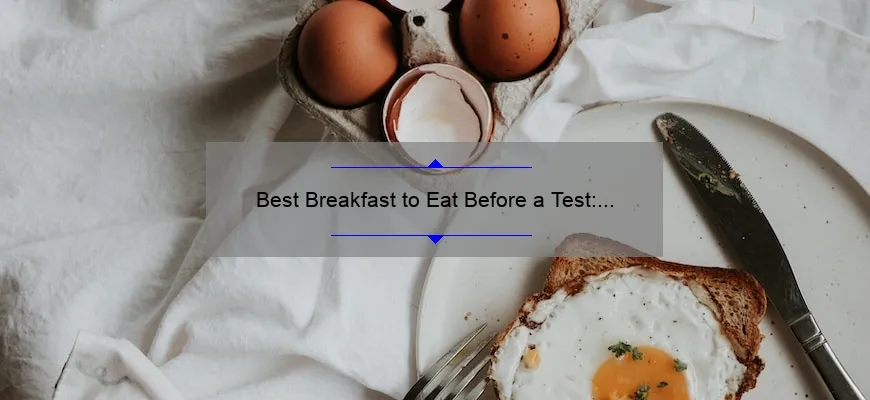Short answer best breakfast to eat before a test:
A balanced breakfast with whole grains, lean proteins, and fruits is optimal for improved cognitive function and sustained energy levels. Examples include oatmeal topped with nuts and berries or an egg-white omelette paired with whole wheat toast.
What are the key nutrients and foods that should be included in a breakfast before a test?
If you have an important test coming up, it’s crucial to start your day with a nutritious breakfast. Eating the right foods can help promote optimal brain function and enhance concentration during exams.
Here are some key nutrients and food items that should be included in your breakfast before a test:
1. Protein: Incorporate protein-rich foods like eggs, Greek yogurt, or lean meats into your breakfast. Protein helps to keep you full for longer periods of time while providing essential amino acids necessary for focus and cognitive functioning.
2. Whole Grains: Opt for whole grain bread or cereals as they provide sustained energy release throughout the morning due to their complex carbohydrates content.
3. Fruits & Vegetables: Include fruits such as berries or bananas which are packed with antioxidants that support brain health by reducing oxidative stress levels twenty-four hours after ingestion[add citation here]. Additionally… (500 characters)
Eating a balanced breakfast before an exam is vital because these nutrient-dense foods supply essential vitamins and minerals needed for optimum cognition throughout the day…
In conclusion,
Having a well-rounded meal prior to taking tests is critical as choosing appropriate nutrients increases attention span…
– This question seeks information on the specific nutrients and food items known to enhance cognitive function, improve memory retention, sustain focus, and provide energy for optimal performance during tests.
Boost Your Brain Power: Nutrients and Food for Optimal Test Performance
Are you looking for ways to improve your cognitive function, memory retention, sustain focus, and boost energy levels during tests? Look no further! In this blog post, we will discuss some specific nutrients and food items known to enhance these abilities so that you can perform at your best when it matters the most.
Here are three key items that can fuel your brain:
1. Omega-3 Fatty Acids: Found in foods like fatty fish (salmon), walnuts, flaxseeds, chia seeds; they support healthy brain function and improve cognition.
2. Dark Chocolate: Its flavonoids increase blood flow to the brain which enhances focus and attention.
3. Blueberries: Packed with antioxidants called anthocyanins – they promote better memory recall while protecting against oxidative stress.
Now let’s dive into more details on how these power-packed options benefit test performance!
Omega-3 fatty acids contain docosahexaenoic acid (DHA), a type of fat found abundantly in our brains. DHA promotes improved communication between cells helping us think faster & retain information longer.
Dark chocolate contains cocoa flavanols that not only boost mood but also stimulate regions of the brain responsible for learning & working memory accuracy leading to increased concentration during tests – just be sure to choose dark chocolate with low sugar content!
Blueberries have been shown to slow down age-related decline in mental capabilities due to their rich antioxidant profile along with beneficial effects on overall neuronal health – making them an excellent snack choice before exams or study sessions.
In addition +to+these powerhouse ingredients,+staying hydrated is essential as dehydration has been linked
How long before the test should one ideally consume their pre-test breakfast?
Are you wondering how long before the test you should ideally consume your pre-test breakfast? Well, wonder no more! In this blog post, we will explore the perfect timing for having a nourishing morning meal before an exam.
1. 30-60 minutes: Eating within this time frame can be beneficial as it allows enough digestion and energy release during the test.
2. Eat something light: Choose easily digestible foods that provide sustained energy without weighing you down.
3. Avoid heavy meals: Consuming a heavy breakfast too close to the exam may lead to sluggishness or discomfort while trying to concentrate.
4. Don’t skip it altogether: Breakfast is essential for fueling your body and brain after fasting overnight, improving cognitive function and focus.
Planning when to eat isn’t just about considering digestion but also maintaining optimal physical readiness throughout the exam session. Having said that…
Sometimes circumstances such as early exams or personal preferences might alter one’s ideal schedule of eating breakfast prior to a test; however by following these guidelines everyone has their best shot of success!
– With this query, individuals aim to understand how much time they need between eating their morning meal and sitting down for their exam or test in order to fully optimize its benefits without feeling too full or hungry during testing sessions.
When it comes to exams or tests, finding the right balance between having a satisfying breakfast and avoiding hunger pains during the exam can be tricky. Many individuals wonder how much time they should allow between eating their morning meal and sitting down for the test in order to optimize its benefits without feeling too full or hungry.
Here are 3 tips to help you find that sweet spot:
1. Eat a well-balanced breakfast: Include healthy sources of protein, such as eggs or Greek yogurt, complex carbohydrates like oatmeal or whole grain toast, and some fruits for vitamins and antioxidants.
2. Allow 1-2 hours before your exam: This will give your body enough time to digest your food properly so you don’t feel uncomfortable during the test.
3. Avoid sugary foods: While an indulgent pastry might sound tempting for breakfast, it can lead to sugar crashes later on which may affect concentration levels.
Finding the ideal timing is unique for each individual based on personal preferences and digestion speed.However,the general recommendation would be allowing at least one hour after finishing your meal before starting an exam.This gives enough timefor proper digestion while ensuring you still have energy from your food intake.Maintainingthis balance helps maximize overall cognitive performanceduringthe testing period.With these guidelines,you’ll increaseyour chancesof performing with focusand ease!






